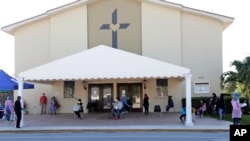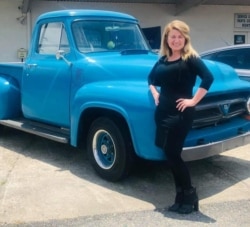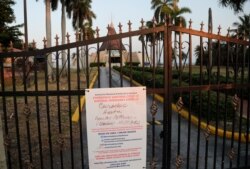Some folks in the U.S. state of Louisiana have strong opinions about attending religious services during the coronavirus shutdown.
“I don’t give a rat’s tail who [Louisiana Gov.] John Bel Edwards thinks is essential and who isn’t,” said Tricia Slaughter, a member of Life Tabernacle Church in Baton Rouge.
Edwards issued a stay-at-home mandate for Louisiana on March 23 that remains in effect. The order limits the operation of businesses that government and health officials consider nonessential.
Of the categories of activities restricted, religious services have been among the most contentious.
Louisiana joined more than two-thirds of the U.S. states in prohibiting or substantially restricting in-person prayer to limit the spread of the virus that causes COVID-19. Edwards has capped the number of individuals able to worship at once at 10.
Churches across the country have temporarily switched to online services to accommodate the restrictions, but some believe these mandates constitute a violation of their religious freedom.
One of the most visible challenges to coronavirus-related mandates has come from Life Tabernacle Church pastor Tony Spell, who continues to hold weekly in-person services with hundreds of congregants despite being placed under house arrest for violating the order.
Many religious Americans sympathize with the desire to congregate and pray together during these challenging times, but they worry churches like Life Tabernacle are unnecessarily putting the public at risk.
“Surely there’s a way to worship without sacrificing the wellness of the world,” said Amanda Pitts, who has attended virtual services with her Texas church since the pandemic began.
But Slaughter insists it’s precisely Life Tabernacle’s in-person services that have maintained her wellness, as well as the wellness of many of her fellow congregants.
Who’s essential?
Slaughter’s defense of her church’s right to hold services is more personal than a debate about the First Amendment.
“I’m an alcoholic,” she explained. “When I first found Life Tabernacle, I was drinking vodka with my blueberry juice every morning. I was abusing prescription drugs. I was dating a married man. My life was a mess.”
Slaughter said she had tried Alcoholics Anonymous, but that the 12-step program never stuck for her.
“I told Pastor Spell all of this,” she said. “I told him about my addictions and abuses, and he told me, ‘You are welcome here.’”
That’s part of what makes Life Tabernacle so special to Slaughter. She says it isn’t like the megachurches often in the news. Her fellow congregants are on average much poorer, and many struggle with issues like her own.
For three years, Slaughter almost exclusively went to Sunday morning services, but she says the uncertainty around COVID-19 makes her anxious. To ensure she didn’t turn to alcohol, she recently began attending Tuesday Bible study groups and another service Sunday evening.
“I never imagined I’d live a day without vodka, but now my family at Life Tabernacle is helping me stay sober during a very difficult time,” she said.
Slaughter has nothing against those who enjoy their virtual services, though. She’s just worried it might not address the needs of the most vulnerable.
She says just as the government is prioritizing certain types of businesses, virtual services require the church to call upon what she says are its most “essential” congregants. Online services often feature instrumentalists, vocalists and those with exceptional biblical knowledge for readings.
“But I’m not any of those things,” she said. “That’s what's so special about being in-person at Life Tabernacle. We’re all treated like we’re essential here.”
Health Risks
Many say, however, that the larger public health risks should outweigh individual benefits.
Yuria Orihuela attends church in Miami. Florida has removed major restrictions to attending religious services, but Orihuela’s church, like many others in the state and country, have decided to continue with virtual-only services for now.
She says she would not attend in-person services, even if her church offered them.
“To put yourself and your family in danger, when scientists are telling you it isn’t wise, is being careless and uncaring, or simply ignorant,” she said. “I think it would be an irresponsible choice.”
Since the outbreak, there have been several instances of churches becoming virus hotspots. For example, more than 40 attendees of a March 15 service in Illinois developed coronavirus symptoms.
A beloved Virginia bishop died of the virus after holding in-person services into late-March.
Slaughter says Life Tabernacle isn’t ignoring the risks of COVID-19. She knows of nine fellow congregants who have contracted the disease. The East Baton Rouge Coroner’s Office confirms one congregant, Harold Orillion, died from complications because of the virus.
“The media is creating this story of us being careless or rebellious,” said another Life Tabernacle Church member, Courtney Tobias, “but that’s not true.” Tobias said congregants have their temperature taken before they enter the church, they are asked to wear face masks, they sanitize their hands and they sit only with their household.
She says pastor Spell told church membership the virus was something to be concerned about and that if anyone didn’t feel safe coming to church, they would be welcomed back warmly when they choose to return.
“A lot of the church elderly have decided not to attend for now,” Tobias said, “and that includes the pastor’s aunt. This is something we are taking seriously.”
Priorities
“I don’t think some people understand how important church is to certain communities,” Tobias said. She acknowledges there are people who can go three months without an in-person service and be fine.
“But a lot of our congregation can’t,” she said. “We have members who are victims of drug addiction, alcoholism, suicidal thoughts and molestation. We have kids from broken or unhealthy homes, and -- for them -- the church is their reliable place free of violence and guns and drugs.”
Tobias says virtual church might work for some, but a lot of the congregation doesn’t have the tools to make virtual services work.
“I don’t have high-speed internet or a smartphone,” Slaughter said, “and that’s the case for many in our congregation.”
Many members of the church also are without vehicles. Life Tabernacle has 27 buses it sends around the region to pick up congregants each Sunday. Members say this makes it unfeasible to organize into smaller 10-person services.
Jen Olano has enjoyed her New Orleans church’s virtual services and says her Bible study meets regularly on Zoom. She says it upsets her to see people going against the stay-at-home order but feels that the issue can be complicated.
“You wouldn’t deny a cancer patient treatment during coronavirus,” she said, “so how can we deny those struggling with addiction and mental illness the support they need?”
Tobias says she understands that governments are trying to balance the welfare of all their citizens, but she agrees with Slaughter that some of their priorities are questionable.
“They’re making it so hard for me to go to the place I need to fight my alcoholism,” Slaughter said. “But do you know where they make it really easy for me to go? The liquor store. The liquor store is considered essential.”







